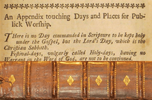--"...the Church Calendar repeats the same endless cycle, Advent, Christmas, Epiphany, Lent, Easter, Ascension, Pentecost, only to start over again with Advent. The biblical view, on the other hand, recognizes that the events of Christ’s ministry are in the past and that we are moving forward to a goal—the consummation of history, the return of Christ, the final judgment, and eternity with our triune Lord."
" Note the language that is used to describe the Church Calendar: “In the liturgical year the various aspects of the one Paschal mystery unfold. This is also the case with the cycle of feasts surrounding the mystery of the incarnation” (Catechism of the Catholic Church, p. 303, § 1171; emphasis). Notice that the church calendar operates on a cyclical pattern. It is ancient pagan religions that have a cyclical view of history: “The world-cycle runs its course, obeys it stars, absolves its round, and then the end links on to a new beginning, ushering in a repetition of the same sequence” (Geerhardus Vos, Pauline Eschatology, p. 334). A cyclical view of history is at odds with the biblical view, which is linear—a definite beginning and end, not an endless repetitive cycle. The Church should not expect “a quasi-consummation, which would bear on its face the Sisyphus-expression of endless toil” (Vos, Pauline Eschatology, p. 334). In other words, the Church Calendar repeats the same endless cycle, Advent, Christmas, Epiphany, Lent, Easter, Ascension, Pentecost, only to start over again with Advent. The biblical view, on the other hand, recognizes that the events of Christ’s ministry are in the past and that we are moving forward to a goal—the consummation of history, the return of Christ, the final judgment, and eternity with our triune Lord.
God reminds us of this linear understanding of history, a beginning and an end, by the Sabbath. " By Dr. Fesko: https://web.archive.org/web/2017092...s/45-why-dont-we-use-the-church-calendar.html

" Note the language that is used to describe the Church Calendar: “In the liturgical year the various aspects of the one Paschal mystery unfold. This is also the case with the cycle of feasts surrounding the mystery of the incarnation” (Catechism of the Catholic Church, p. 303, § 1171; emphasis). Notice that the church calendar operates on a cyclical pattern. It is ancient pagan religions that have a cyclical view of history: “The world-cycle runs its course, obeys it stars, absolves its round, and then the end links on to a new beginning, ushering in a repetition of the same sequence” (Geerhardus Vos, Pauline Eschatology, p. 334). A cyclical view of history is at odds with the biblical view, which is linear—a definite beginning and end, not an endless repetitive cycle. The Church should not expect “a quasi-consummation, which would bear on its face the Sisyphus-expression of endless toil” (Vos, Pauline Eschatology, p. 334). In other words, the Church Calendar repeats the same endless cycle, Advent, Christmas, Epiphany, Lent, Easter, Ascension, Pentecost, only to start over again with Advent. The biblical view, on the other hand, recognizes that the events of Christ’s ministry are in the past and that we are moving forward to a goal—the consummation of history, the return of Christ, the final judgment, and eternity with our triune Lord.
God reminds us of this linear understanding of history, a beginning and an end, by the Sabbath. " By Dr. Fesko: https://web.archive.org/web/2017092...s/45-why-dont-we-use-the-church-calendar.html

